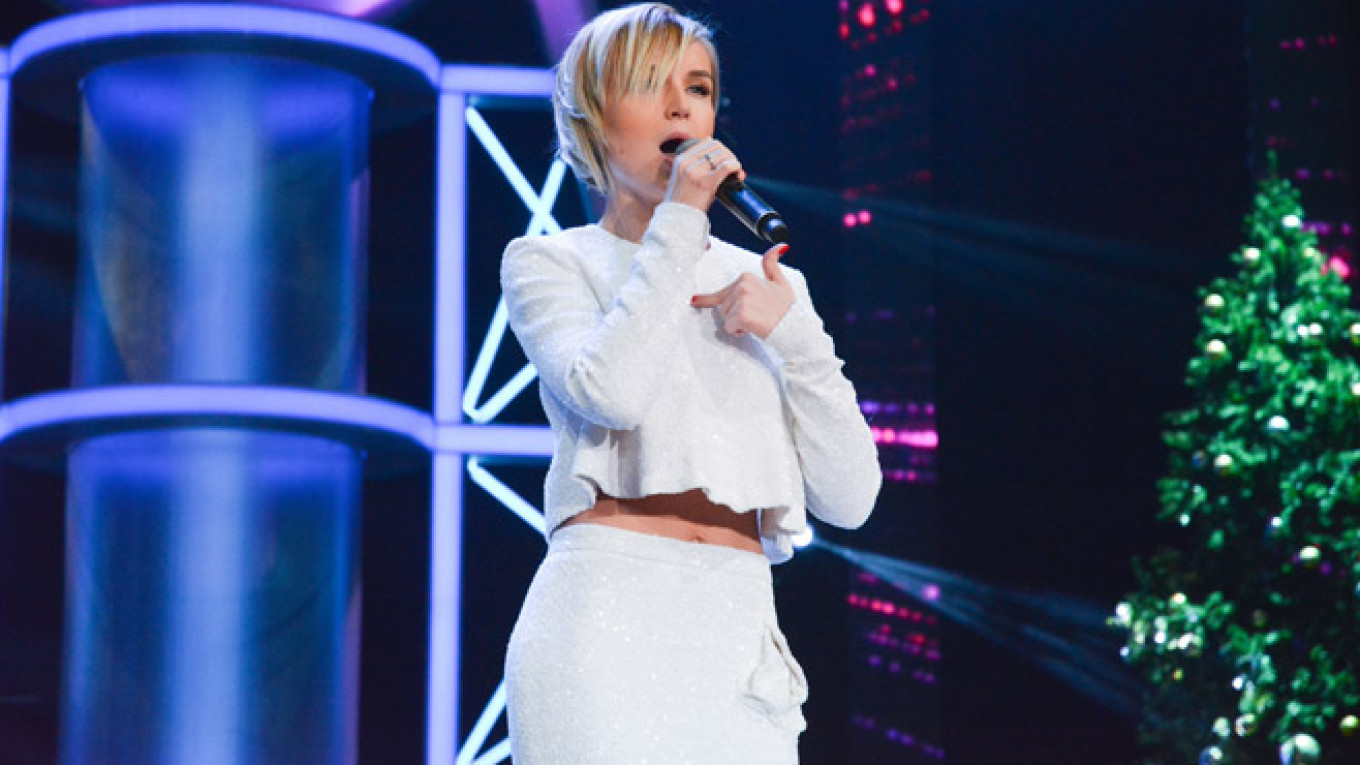Pop star Polina Gagarina will represent Russia at this year’s Eurovision Song Contest in Vienna, Austria. Gagarina, who is best known for appearing on the reality music show Star Academy 2, will sing the power ballad “A Million Voices” as Russia attempts to secure its second victory.
Gagarina, 27, isn't in the same league as previous pop stars like Dima Bilan, who won in 2008, or the legendary Alla Pugachyova, who came 20th in 1997. Still, she has her own fan base after appearing at the local Eurovision equivalent, the annual New Wave competition in Latvia and releasing hits like “The Show is Finished.” She was chosen by Channel One without a public vote.
“This is a level up for me. And I’m happy to represent my country at such a high-ranking international contest,” said Gagarina in comments on the Eurovision official website.
“A Million Voices” has saccharine lines like “We are the world’s people, different yet we’re the same. We believe, we believe in the dream.”
Gagarina too was on message about her song's values.
“It is a song of peace for everyone, children, elderly … it is about love [which] is the only meaning of life and a million voices are talking about this,” the singer said, wide eyed and smiling, in a Channel One report on Wednesday.
But beneath the excited reports on television, Russia has a stormy relationship with the Eurovision song contest. At first glance it fits perfectly into the Russian pop scene, which is also filled with camp and flamboyant, screechy characters — all qualities that mean Eurovision draws equal amounts of enthusiasm and derision.
Russia has long strived for success. It has made every final since the introduction of semifinals in 2004 and holds the record for the most top five finishes in the 21st century — seven — a shared accolade with Sweden.
But in the last year, Eurovision has also been used as a way to attack Europe for its values.
Vitaly Milonov, legislator and architect of Russia’s anti-gay laws, has long opposed Russia’s participation in the Eurovision song contest.
“I did not know she [Gagarina] was to take part and I am not interested,” he said in a telephone interview Thursday. “In principle, I am against Russia taking part in this degraded European [competition]. War and sanctions continue, it is not worth putting ourselves forward in front of those who are waging war against our country.”
He said that an alternative international music competition would be more “dignified” and could attract popularity and participation from countries like China.
Last year, Milonov lashed out against the contest after bearded Austrian drag queen Conchita Wurst, won calling Wurst a “pervert” and condemning the contest as a “hotbed of sodomy.”
Before Gagarina was chosen, tabloid paper Komsomolskaya Pravda also turned on the contest with a snide piece on two entries from Finland and Poland for this year's contest: the first a punk group, some of whose members have Down Syndrome, the second a singer in a wheelchair.
“What is Eurovision turning into? How do we choose and by what criteria? Who we are more sorry for?,” wrote the paper.
In turn, the Eurovision audience seems to have turned against Russia. Last year's Russian entry, the twins Anastasia and Maria Tolmachevy received a less-than-warm welcome as the Eurovision gay-friendly audience responded to Russia’s controversial anti-gay propaganda law and events in Ukraine. The Tolmachevy twins were booed several times during the contest but still took seventh place overall.
Nevertheless, Gagarina is predictively positive about the song. “It is a song that is sincere, good and symbolic and it will be the voice of Russia,” she said on Channel One.
A Message from The Moscow Times:
Dear readers,
We are facing unprecedented challenges. Russia's Prosecutor General's Office has designated The Moscow Times as an "undesirable" organization, criminalizing our work and putting our staff at risk of prosecution. This follows our earlier unjust labeling as a "foreign agent."
These actions are direct attempts to silence independent journalism in Russia. The authorities claim our work "discredits the decisions of the Russian leadership." We see things differently: we strive to provide accurate, unbiased reporting on Russia.
We, the journalists of The Moscow Times, refuse to be silenced. But to continue our work, we need your help.
Your support, no matter how small, makes a world of difference. If you can, please support us monthly starting from just $2. It's quick to set up, and every contribution makes a significant impact.
By supporting The Moscow Times, you're defending open, independent journalism in the face of repression. Thank you for standing with us.
Remind me later.






